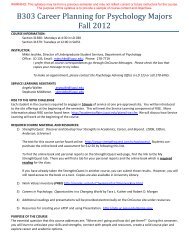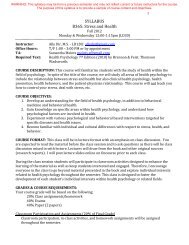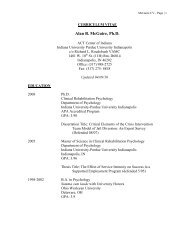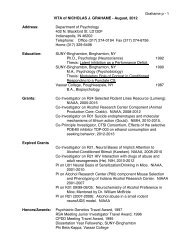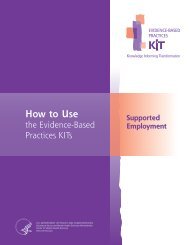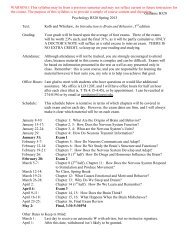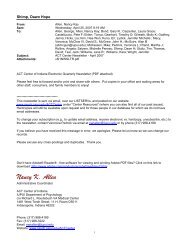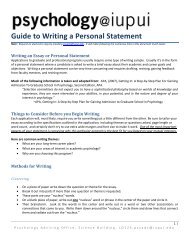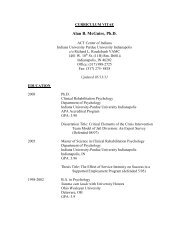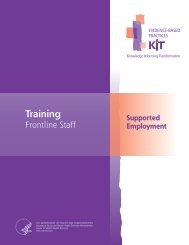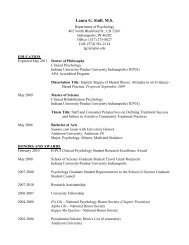B360 Course Syllabus, Fall 2012, Hellyer - Psychology @ IUPUI
B360 Course Syllabus, Fall 2012, Hellyer - Psychology @ IUPUI
B360 Course Syllabus, Fall 2012, Hellyer - Psychology @ IUPUI
You also want an ePaper? Increase the reach of your titles
YUMPU automatically turns print PDFs into web optimized ePapers that Google loves.
WARNING: This syllabus may be from a previous semester and may not reflect current or future instructors for the course.<br />
The purpose of this syllabus is to provide a sample of course content and objectives.<br />
CHILD AND ADOLESCENT<br />
PSYCHOLOGY<br />
<strong>Psychology</strong> <strong>B360</strong> 10746<br />
Web <strong>Course</strong><br />
Instructor: Dr. Sandra J. <strong>Hellyer</strong><br />
Contact Information<br />
Office Hours<br />
Required Text<br />
Prerequisites<br />
Computer Requirements<br />
shellyer@iupui.edu or through Oncourse<br />
By appointment<br />
Child Development, Laura E. Berk (9th Edition, 2013), Pearson (required)<br />
3 credits of psychology<br />
Reliable, high-speed internet access is recommended, especially when taking<br />
exams.<br />
For Windows users, Oncourse CL is best accessed with the following web<br />
browsers: Internet Explorer 6.0 and newer, Netscape 8.x and newer, or Mozil<br />
Firefox.<br />
For Macintosh users, recommended browsers are Netscape 7.1 and newer or<br />
Mozilla Firefox 1.0.<br />
Strongly 1) good Recommended<br />
computer skills, 2) ability to work well independently<br />
Internet Site. This course will use Oncourse CLas the platform for distance learning. I<br />
will use Oncourse to provide you with course-related information and grades, you will<br />
submit assignments to me as Word documents using the Assignments tool, and most<br />
importantly, we will use the Discussion Forums and email within Oncourse as our<br />
primary means of communicating with each other. Check Oncourse at least twice each<br />
week for course announcements, and to participate in electronic discussions with<br />
other members of the class. Oncourse can be used from anywhere you have internet<br />
access, including any of the computer labs on campus. Point your web browser to:<br />
http://oncourse.iu.edu/ and log in (you must know your User ID and password). Choose<br />
<strong>B360</strong> and you’re ready to go! To make changes to your computer accounts, go to the<br />
UITS website at http://uits.iu.edu/ or call the UITS help desk at (317) 274-HELP. <br />
There are a number of campus-wide policies governing the conduct of<br />
courses at <strong>IUPUI</strong>. These can be found at<br />
http://registrar.iupui.edu/course_policies.html
WARNING: This syllabus may be from a previous semester and may not reflect current or future instructors for the course.<br />
The purpose of this syllabus is to provide a sample of course content and objectives.<br />
<strong>Course</strong> Overview. We will cover the physical, social, and cognitive changes in human<br />
development from conception through adolescence. Because of this focus, the course is<br />
divided into three sections: prenatal and physical development, cognitive development,<br />
and social development. In each section, emphasis will be placed on research findings<br />
that relate to real-world application of child and adolescent development. Individual and<br />
cultural differences will be addressed in the course content.<br />
You must be an independent learner and comfortable using technology (e.g., email, the<br />
internet, electronic references) in order to take this course. You also need access to a<br />
computer with an internet connection.<br />
Specific Learning Objectives. Completion of this course should enable mastery of the<br />
following 10 specific learning objectives, which are aligned with five of <strong>IUPUI</strong>’s<br />
Principles of Undergraduate Learning:<br />
Principle<br />
Intellectual Depth and<br />
Adaptiveness<br />
Analytical Thinking<br />
Application and Integration of<br />
Knowledge<br />
Communication Skills<br />
Understanding Society and<br />
Culture<br />
Specific Learning Objectives<br />
1. Distinguishing among the major theories of human development and<br />
dimensions along which such theories vary.<br />
2. Articulating the interaction between heredity and environment in dete<br />
human development.<br />
3. Describing prenatal development, the birth process, neonatal develop<br />
development during infancy, early childhood, middle and later childhood<br />
4. Applying the methods used in developmental research and differentia<br />
appropriate and inappropriate methods for conducting empirical research<br />
theoretical issues.<br />
5. Explaining how research contributes to the understanding of developm<br />
evaluate how research fits with particular developmental theories.<br />
6. Interpreting particular developmental events from t<br />
the major developmental theories (i.e. psychoanalytic,<br />
7. Applying knowledge about development to real‐life situations releva<br />
care, education, and social policy.<br />
8. Writing about empirical research in developmental psychology and e<br />
thoughts about development in both written examinations and through co<br />
discussions.<br />
9. Explaining the development of human beings in a s<br />
and historical context.<br />
10. Recognizing and appreciating ethical standards involved in conducti<br />
research and developing social policies related to human development.<br />
Accessing <strong>Course</strong> Materials. You will read chapters from your textbook and complete<br />
modules for each chapter. Chapter assignments can be accessed from within the<br />
Oncourse system. Assignments were developed collaboratively by Dr. Terri Tarr, Dr.<br />
Shenan Kroupa, and Dr. Kathy Johnson, who are all developmental psychologists at
WARNING: This syllabus may be from a previous semester and may not reflect current or future instructors for the course.<br />
The purpose of this syllabus is to provide a sample of course content and objectives.<br />
<strong>IUPUI</strong>.<br />
Requirements. You will be required to complete five examinations, do six written<br />
assignments, participate in 15 online discussion forums, and complete practice tests for<br />
each chapter while taking this course. Details concerning each type of requirement and<br />
the calculation of grades are presented below:<br />
1. Examinations (250 course points). Five multiple choice examinations (each covering<br />
three chapters from your text) will be administered during 7-day testing periods. Each<br />
examination will include 50 questions worth 1 point each. Exams can be taken from any<br />
computer with an internet connection, and will be accessed through the Oncourse Test<br />
and Survey tool during the testing period. Exams may be taken only once, and they must<br />
be taken independently. You will be limited to a 60-minute time period for taking each<br />
test, so please budget your time wisely. Cheating will not be tolerated. If you cheat on an<br />
examination or violate the testing guidelines, you will automatically be assigned a grade<br />
of F for that exam and your case will be reported in writing to the department chairperson<br />
and to the Dean of Faculties, as outlined in the <strong>IUPUI</strong> Academic Handbook. Examination<br />
access will be monitored closely to ensure that tests are taken independently and that the<br />
60-minute limit is adhered to. Please note that the timer begins as soon as your open the<br />
test (not when you click on the pop-up window stating the time limit). The instructor has<br />
access to a test log that shows the time from when you open the test to when you submit<br />
it.<br />
Make up exam. Plan ahead so you take the exams well before the last possible testing<br />
time. However, if you miss one of the five exams for any reason, you must take the<br />
cumulative final examination during finals week to make up for the one exam that you<br />
missed.<br />
Optional Final Exam. You may take a cumulative final exam to<br />
replace your lowest exam grade (if you score lower on the final<br />
exam than on your lowest exam grade, the grade from the<br />
cumulative final will be dropped) or to make up a missed exam.<br />
The cumulative final will include 50 multiple choice questions and<br />
will cover all 15 chapters that you were required to read during the<br />
course. If you are pleased with your five term exam scores, you<br />
are not required to take the final exam. If you do choose to take<br />
the final exam, please note that the Exam 5 must be taken before<br />
the Final Exam. There is a 60-minute time limit for the Final<br />
Exam.<br />
2. Written Assignments (120 course points). You are required to complete 6 (ONLY,
WARNING: This syllabus may be from a previous semester and may not reflect current or future instructors for the course.<br />
The purpose of this syllabus is to provide a sample of course content and objectives.<br />
no extra credit for extra written assignments) of 15 possible assignments, THREE<br />
FROM THE FIRST SEVEN CHAPTERS AND THREE FROM THE<br />
REMAINING CHAPTERS, to be accessed and submitted through Oncourse. Each<br />
assignment is worth 20 points, and typically will involve a written response to<br />
questions (at least 500 words in length for all assignments) (often involving an<br />
application of course material), or engagement in a Web-based activity. Assignments can<br />
be found and submitted in the Assignments tool. The due dates for each assignment<br />
appear later in this syllabus. Assignments will be accepted ONLY until the assigned<br />
period for that particular chapter has ended!! No late submissions accepted. You<br />
will NOT be given extra credit for completing more than the assigned number of<br />
assignments.<br />
3. Discussion Forums (75 course points). For each chapter, I have posted a discussion<br />
topic or question on a discussion forum. Discussion forums will be restricted to members<br />
of the same group (affectionately named after Dr. Suess books) in order to keep the<br />
dialogue manageable. You will be assigned to a group alphabetically, based on your last<br />
name. You will receive 5 points for posting your response to the issue posed in each<br />
discussion forum. Discussion forums are located in the Forums area in the left navigation<br />
bar of Oncourse. Partial credit will be awarded for postings that are obviously made in<br />
haste, or that conflict with established developmental principles. Everyone’s involvement<br />
in the discussion forums is critical in order for us to continue to be connected to each<br />
other as a class, so you are encouraged to read and respond to other students’ postings.<br />
Discussion forum points will be accepted until the assigned period for that<br />
particular chapter has ended.<br />
4. Eight Nouns Discussion Forum (10 points). Participation in the Eight Nouns<br />
Discussion Forum will give all of us in class a chance to get to know each other. You will<br />
receive 10 points for posting information about yourself in the Eight Nouns discussion<br />
forum.<br />
5. Practice Tests (45 possible course points). You are required to take a practice test for<br />
each of the 15 chapters. Practice tests are located in Test and Survey tool in Oncourse.<br />
Practice tests are due on the same day that discussion forum postings and written<br />
assignments are due for a particular chapter. You will receive 3 points each time you<br />
receive a passing score (61% or higher) on the practice tests. You may take practice tests<br />
more than once as needed to get the required 61%.<br />
Calculation of Grades. Your final course grade will be based on the following system.<br />
ASSESSMENT QUANTITY POINTS EACH TOTAL POINTS<br />
Exams 5 50 250<br />
Written Assignments 6 20 120<br />
Discussion Forums 15 5 75<br />
Eight Nouns Discussion Forum 1 10 10
WARNING: This syllabus may be from a previous semester and may not reflect current or future instructors for the course.<br />
The purpose of this syllabus is to provide a sample of course content and objectives.<br />
Practice Tests 15 3 45<br />
Total Points 500<br />
Letter grades will be assigned as follows:<br />
LOWEST<br />
POINTS<br />
NEEDED<br />
Policies:<br />
GRADE<br />
LOWEST<br />
POINTS<br />
NEEDED<br />
487 A+ 387 C+<br />
462 A 362 C<br />
447 A- 347 C-<br />
437 B+ 337 D+<br />
412 B 312 D<br />
397 B- 297 D-<br />
GRADE<br />
Civility and Respect. We each have our own personal experiences with children and<br />
families. Please remember that in this class the textbook presents research findings, and<br />
you will frequently be encouraged to ask questions and share your opinions with other<br />
members of the class through discussion forums. While it is important that you<br />
understand and are able to interpret the research findings, I also understand that people<br />
may disagree concerning how the results of developmental research translate into<br />
everyday applications (e.g., public policy, educational policy, parenting practices).<br />
Please help to maintain an atmosphere of civility in all interactions with class members,<br />
and be respectful of opinions that are different from your own.<br />
EXTRA CREDIT – The optional final is an opportunity to raise one test score.<br />
Academic Dishonesty. Cheating and plagiarism will not be tolerated. If you are caught<br />
cheating or using someone else’s words or ideas as your own you will receive a zero for<br />
that exam or written assignment, and your case will be reported in writing to the<br />
department chairperson and to the Dean of Students, as outlined in the <strong>IUPUI</strong> Academic<br />
Handbook.<br />
Incompletes. I will follow the School of Science guidelines pertaining to grades of I<br />
(Incomplete). "Incomplete" grades will be assigned only if (a) you have completed the<br />
majority of the coursework; (b) you are passing the course; and (c) you have contacted<br />
me to make arrangements for completing the remainder of the course requirements. If<br />
you simply stop participating and do not complete all of your coursework, your final<br />
grade will be calculated based on "0" grades for the assignments/exams that are missing.<br />
COURSE SCHEDULE. Please note that the course schedule is<br />
tentative and subject to change. Any changes made will be
WARNING: This syllabus may be from a previous semester and may not reflect current or future instructors for the course.<br />
The purpose of this syllabus is to provide a sample of course content and objectives.<br />
announced in Oncourse.<br />
CHAPTER Topic Reading Discussion Forum, W<br />
1 History, Theory, and Ch. 1 1: Mon, Aug 29 6:00 p<br />
Applied Directions<br />
Eight Nouns Discussion<br />
Mon, Aug. 29 6:00 p.m.<br />
Forum<br />
2 Research Strategies Ch. 2 2: Mon, Sept 5 6:00 p.m<br />
3 Biological Foundations, Ch. 3 3: Mon, Sept 12 6:00 p<br />
Prenatal Development, and<br />
Birth<br />
Exam 1 on Chapters 1-3: Tues, Sept 13– Mon, Sept 19 at 11:55 pm<br />
4 Infancy: Early Learning, Ch. 4 4: Mon, Sept 19 6:00 p<br />
Motor Skills, and Perceptual<br />
Capacities<br />
5 Physical Growth Ch. 5 5: Mon, Sept 26 6:00 p<br />
6 Cognitive Development: Ch. 6 6: Mon, Oct 3 6:00 p.m<br />
Piagetian, Core Knowledge,<br />
and Vygotskian Perspectives<br />
Exam 2 on Chapters 4-6: Tues, Oct 4 - Mon, Oct 10 at 11:55 pm<br />
7 Cognitive Development: An Ch. 7 7: Mon, Oct 10 6:00 p.m<br />
Information-Processing<br />
Perspective<br />
8 Intelligence Ch. 8 8: Mon, Oct 17 6:00 p.m<br />
9 Language Development Ch. 9 9: Mon, Oct 24 6:00 p.<br />
Exam 3 on Chapters 7-9: Tues, Oct 25 - Mon, Oct 31 at 11:55 pm<br />
10 Emotional Development Ch. 10 10: Mon, Oct 31 6:00 p<br />
11 Self and Social<br />
Ch. 11 11: Mon, Nov 7 6:00 p<br />
Understanding<br />
12 Moral Development Ch. 12 12: Mon, Nov 14 6:00<br />
Exam 4 on Chapters 10-12: Tues, Nov 15– Mon, Nov 21 at 11:55 pm<br />
13 Development of Sex<br />
Differences and Gender<br />
Ch. 13 13: Mon, Nov 21 6:00
WARNING: This syllabus may be from a previous semester and may not reflect current or future instructors for the course.<br />
The purpose of this syllabus is to provide a sample of course content and objectives.<br />
Optional Final: Tues Dec. 6 – Mon Dec 12 at 11:55 pm (NOTE: Exam 5 must<br />
Roles<br />
14 The Family Ch. 14 14: Mon, Nov 28 6:00<br />
15 Peers, Media, and Schooling Ch. 15 15: Mon, Dec 5 6:00 p<br />
Exam 5 on Chapters 13-15, Tues, Dec 6 – Mon Dec 12 at 11:55 pm<br />
taken prior to Final Exam)<br />
Please note that Exam 5 and the Final Exam close on a MONDAY.



